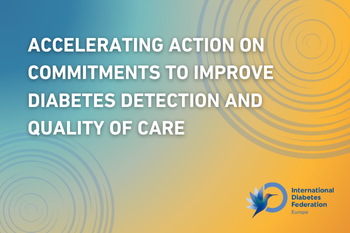~0%
Close to 10% of adults (66 million) live with diabetes. This is forecast to increase to 72.4 million by 2050.
0m
Approximately 3.4 million adults aged 20-79 years
are estimated to have died because of diabetes or its
complications in 2024.
are estimated to have died because of diabetes or its
complications in 2024.
0%
34% of adults living with diabetes were undiagnosed in 2024.
0m
The Region has the highest number of people with type 1 diabetes (2.7 million), 15% of whom are aged under 20 years (419,000).
-0Y
The life expectancy of people living with Type 2 Diabetes is up to 10 years shorter compared to that of people not living with the disease.
€0B
The cost of diabetes-related health expenditure was estimated to be €178 billion in 2024.
0%
One in seven live births is affected by hyperglycaemia in pregnancy. Exposure to hyperglycaemia in utero may predispose children to a high risk of becoming overweight or obese.

Diabetes is a complex and multi-faceted condition (14 disease types, with distinct onset mechanism, facilitated by various risk factors), but is often misunderstood as solely a lifestyle disease by policy-makers, healthcare professionals and the general population alike.
The most common types of diabetes are:
– Type 1 diabetes, an auto-immune condition, which often develops in children and younger adults;
– Type 2 diabetes which tends to develop in older adults as a result of unmodifiable genetic, physiological, environmental and modifiable, risk factors; and
– Gestational diabetes, which develops during pregnancy.
- Diabetes is a key risk factor for many other non-communicable diseases such as cardio-vascular and kidney disease and more serious forms of COVID-19.
- Currently, close to one in ten adults (61 million) live with diabetes in Europe, a figure which continues to rise unabated.
- By 2030, it is forecast that some 67 million Europeans will live with the condition. Diabetes represents a significant burden for individuals (financial, emotional and psychological), society at large and health systems. In 2021, direct diabetes health expenditure stood at €167.5 bn.

Objectives
The MEP Interest Group on Diabetes aims to elevate diabetes on the EU political agenda, promote understanding of the multi-faceted nature of the disease and dispel common misperceptions, and through close collaboration with the Commission/Council/individual Member States (MS), foster EU policy measures and action around a series of priorities, as follows:
– Improving diabetes management, care and risk reduction approaches
– Promoting better (affordable), uninterrupted, access to the medicines and technologies required & reducing health inequalities
– Eliminating stigma and discrimination against people living with diabetes
Optimal diabetes management and care result in better health outcomes and quality of life for people living with diabetes, while risk-reduction approaches lower the risk of people developing diabetes and/or diabetes-related complications such as retinopathy, kidney disease, cardiovascular diseases etc.
Some of the key measures required to achieve this include:
- The promotion of health-enabling environments and risk-reduction frameworks addressing the condition’s modifiable risk factors as well as the social and environmental determinants of health;
- An improvement in the implementation of an integrated, person-centred and outcomes-based, care framework
- An acceleration of the move towards more digital health, including data standardisation and exchange
Some of the key measures required to achieve this include:
- Heightening focus on innovation in diabetes care and advanced therapies including new technologies as well as digital health and personalised medicine;
- Integrating people at all stages of the technology development and drug discovery continuum, from early research through to the final assessment of the product value;
- Developing value-based health propositions – evaluating value-based healthcare, not just against the monetary benefit it can bring to national healthcare systems, but also taking into account the real value it brings to people.
Some of the key measures required to achieve this include:
- Emphasising the multi-faceted nature of the condition, away from its characterisation as a lifestyle disease, and promote respect towards people living with diabetes;
- Supporting EU-wide awareness-raising campaigns targeting individual stakeholder groups;
- Fostering the empowerment of people living with diabetes and ensure that no-one is left behind by improving people’s health and digital literacy.
The MEPs Mobilising for Diabetes are currently developing a Roadmap to 2030, which will explore in detail the key policy actions required to flatten the diabetes curve by 2030 and help meet Sustainable Development Goal, Target 3.4 – reduce by one-third premature mortality from noncommunicable diseases through prevention and treatment and promote mental health and well-being.
























How do I join the MEP Interest Group on Diabetes ?
Why join the MEP Interest Group on Diabetes?
Knowledge
- MEPs will receive evidence-based information on all aspects of diabetes management, care and risk-reduction approaches and related policy issues. MEPs can also contact the Secretariat for any questions they may have.
- MEPs will also be kept updated on all relevant developments in the field.
Connections
- MEPs will join a group of colleagues committed to making a difference for people living with diabetes.
- MEPs will strengthen their connections with a broad range of diabetes stakeholders across Europe, including organisations representing people living with diabetes, healthcare professionals, other civil society and non-governmental organisations and stakeholders.
- MEPs will also have the opportunity to build relationships and engage with other MEPs and decision-makers within other European institutions such as the European Commission.
Representation
- MEPs who are part of the MEP Interest Group will have more legitimacy to speak on diabetes matters, and be more effective in tackling areas of importance to their constituents.
The Secretariat for the MEP Interest Group on Diabetes is provided by IDF Europe. The Secretariat organises a meeting of the co-chairs and members, and where appropriate external stakeholders, four times a year to discuss activities.
The last meeting of each year will be dedicated to an assessment of the activities of the past year, and will pave the way for the development of the following year’s work programme. Attendance at this meeting is limited to the MEPs, their assistants, and the Secretariat.
Members of the MEP Interest Group are free to engage in the group’s meetings and activities based on their own interests and agendas but regular participation is appreciated and encouraged.
The Secretariat organises a meeting of the co-chairs and members, and where appropriate external stakeholders, four times a year to discuss activities. The last meeting of each year will be dedicated to an assessment of the activities of the past year, and will pave the way for the development of the following year’s work programme. Attendance at this meeting is limited to the MEPs, their assistants,
Members of the MEP Interest Group are free to engage in the group’s meetings and activities based on their own interests and agendas but regular participation is appreciated and encouraged.
The MEPs Mobilising for Diabetes drafted A Blueprint for Action on Diabetes in the EU by 2030, which was released in February 2021. The Blueprint sets out the main priorities to achieve key policy changes and meet Sustainable Development Goal, target 3.4 – reduce by one-third premature mortality from noncommunicable diseases through prevention and treatment and promote mental health and well-being.
The Blueprint defines some of the key activities which will take place over the coming years and will include at least one or two events (webinar, debate, roundtable etc.) to be convened every year to discuss key aspects of diabetes management and care.
Additional activities will include specific legislative and political initiatives and the development of a closer dialogue with other European Institutions, national Member States and other relevant stakeholders.
📣We are pleased to invite you to our policy #event "Re-thinking health in the EU to improve access to quality #diabetes prevention and care", hosted by MEP @peteragius_eu (EPP, Malta).
— IDFEurope / Diabetes (@IDFEuropeBXL) November 4, 2024
➡️Find the registration and agenda here: https://t.co/ps419zSbcI#UnitedForDiabetes #WDD24 pic.twitter.com/kR7XJCGF11
📢Welcome to our new #MMD Member, MEP @V_Andriukaitis! Last week in #Strasbourg, we discussed the importance of a strong #health strategy focused on prevention, promotion, protection, and participation to effectively address #NCDs such as diabetes.🔵
— MEPs Mobilising for Diabetes (@MEPsDiab) October 29, 2024
(1/2) pic.twitter.com/u9BCmPxBVh
🇪🇺Great meeting with MEP @TomislavSokol, #MMD Member, in #Strasbourg. We thank him for his continuous support and dedication to remain a strong public #health champion for this new mandate. Together, we are committed to accelerating action on #NCDs such as #diabetes.🔵 pic.twitter.com/w3cKlDXP99
— MEPs Mobilising for Diabetes (@MEPsDiab) October 23, 2024



